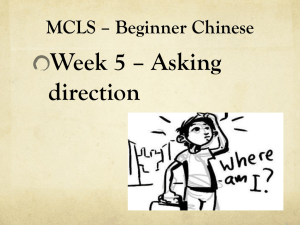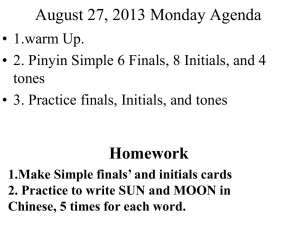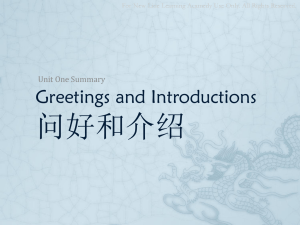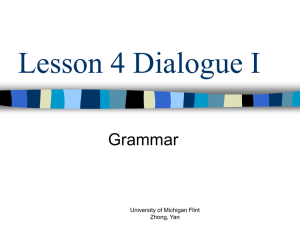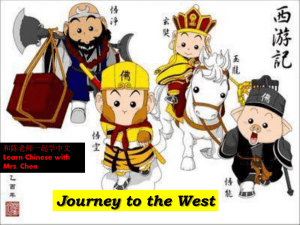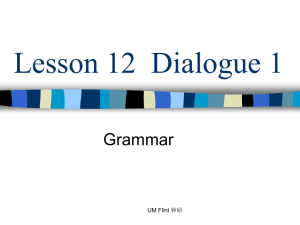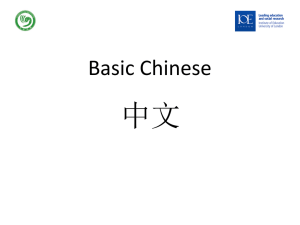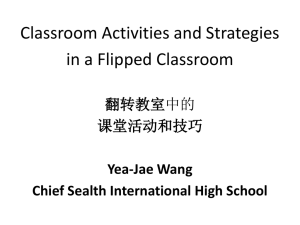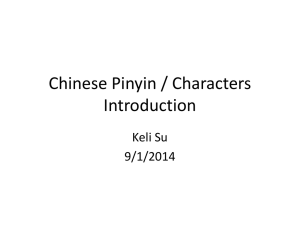你好nǐ hǎo! - 谢老师Mrs. Myhre
advertisement
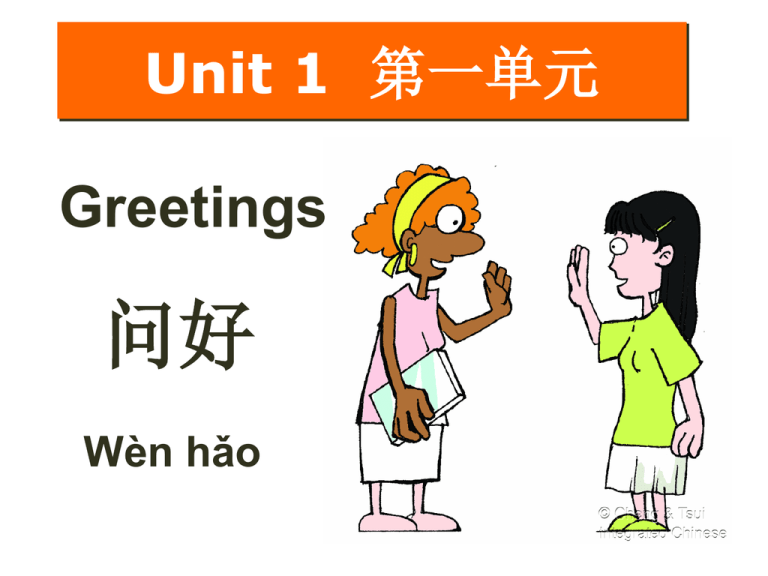
Unit 1 第一单元 Greetings 问好 Wèn hǎo The “2” (second) in ordinal number is always 二, not 两. dì yī the first 第二 dì èr the second 第三 dì sān the third 第一 第一课 第二课 第三课 dì yī kè lesson one dì èr kè lesson two lesson dì sān kè three 第一课 你好! (nǐ hǎo) 你 nǐ 我 wǒ 他 tā (You) (I, me) 们 men (He / She) 你好 nǐ hǎo! Greeting strangers A: nǐ hǎo! 你好! B: nǐ hǎo! 你好! 你 nǐ 我 wǒ 他 tā How are you? How are you? (You) (I, me) 们 men (He / She) 您 nín (you, honorific for ) The personal pronoun您 (nín) is often used to address an older person or someone of a higher social rank. It is common for strangers to address each other with 您 (nín) and then switch to你(nǐ) as they become more familiar with each other. 好 hǎo 你好! nǐ hǎo! 你们好! nǐmen hǎo! 同学们好!tóngxuémen hǎo! 早 zǎo 你早! nǐ zǎo! 你们早! nǐmen zǎo! 同学们早!tóngxuémen zǎo! 你好 (nǐ hǎo)! 您好 (nín hǎo)! 老师 lǎoshī 学生 xuésheng 老师好! lǎoshī hǎo! 是 shì am, are, is 你 nǐ 我 wǒ 他 tā 是 shì 谢 老 师 xiè lǎo shī Family Name + Teacher 好 hǎo 老 师 好! lǎo shī hǎo! How are you , Teacher? Hello, teacher. 你好 Nǐ hǎo! Dialogue 1: Greeting strangers A: nǐ hǎo! 你好! How are you? B: nǐ hǎo! 你好! How are you? Dialogue 2: Teacher-student greetings A: wǒ shì lǎoshī, nǐ shì xuésheng. 我是老师, 你是学生。 (I am the teacher. You are students.) A: nǐmen hǎo! 你们好!How are you? B: lǎoshī hǎo. 老师好!Hello, teacher. zaì jiaǹ 再 见 again; see 第二课 你好吗? 吗 ma (nǐ hǎo ma ) Hello Song: 你好, 你好吗? nǐ hǎo, nǐ hǎo ma 你好, 你好吗? 你好, 你好吗? 我 很 好, 谢谢 wǒ hěn hǎo , xiè xie 。 数来宝(shǔláibǎo) Chinese folk theater consisting of recitation accompanied by clapper board rhythm http://www.youtube.com/watch?v=iOQ_ZWDTkpM A Hello-Goodbye Chinese Rap 你好再見数来宝(nǐhǎo zàijiàn shǔláibǎo) 你好(nǐ hǎo)!您好 (nín hǎo)!你好吗(nǐ hǎo ma)? 还好(hái hǎo),挺好 (tǐng hǎo),我很好 (wǒ hěn hǎo)! 还可以 (hái kěyǐ),还不錯 (hái bú cuò),马马虎虎 (mǎmǎ-huhu)。 谢谢你(xiè xie nǐ), 感谢您(gǎn xiè nín),多谢多谢(duō xiè duō xiè) 不客气 (bú kèqì), 不用谢(bú yòng xiè), 不谢不谢(bú xiè bú xiè)。 对不起 (duìbuqǐ), 很抱歉 (hěn bàoqiàn), 不好意思 (bù hǎo yìsi)。 沒事兒 (méi shìr),不要緊 (bú yàojǐn), 沒有关系 (méiyǒu guānxi)。 再会 (zàihuì),明天見 (míngtiān jiàn),下回再見 (xiàhuí zàijiàn)! Question Tag: 你 吗 (ma) nǐ 我 wǒ 他 tā 是 shì 吗 ma 你是学生吗? xuésheng 你是老师吗? lǎoshī
